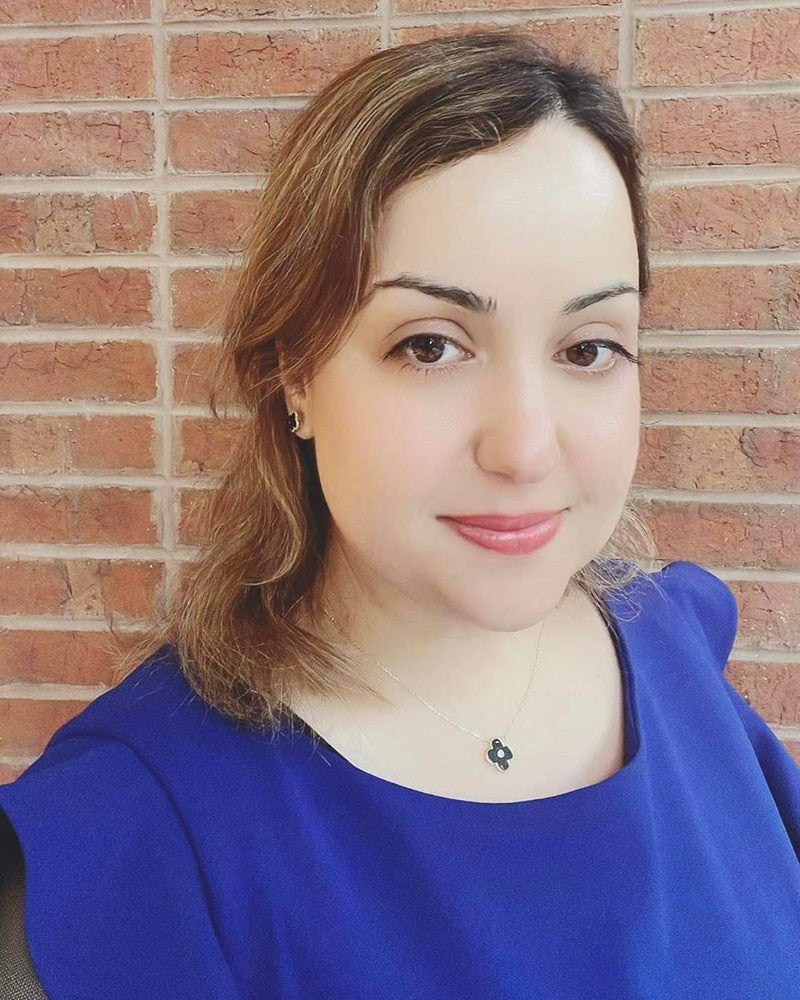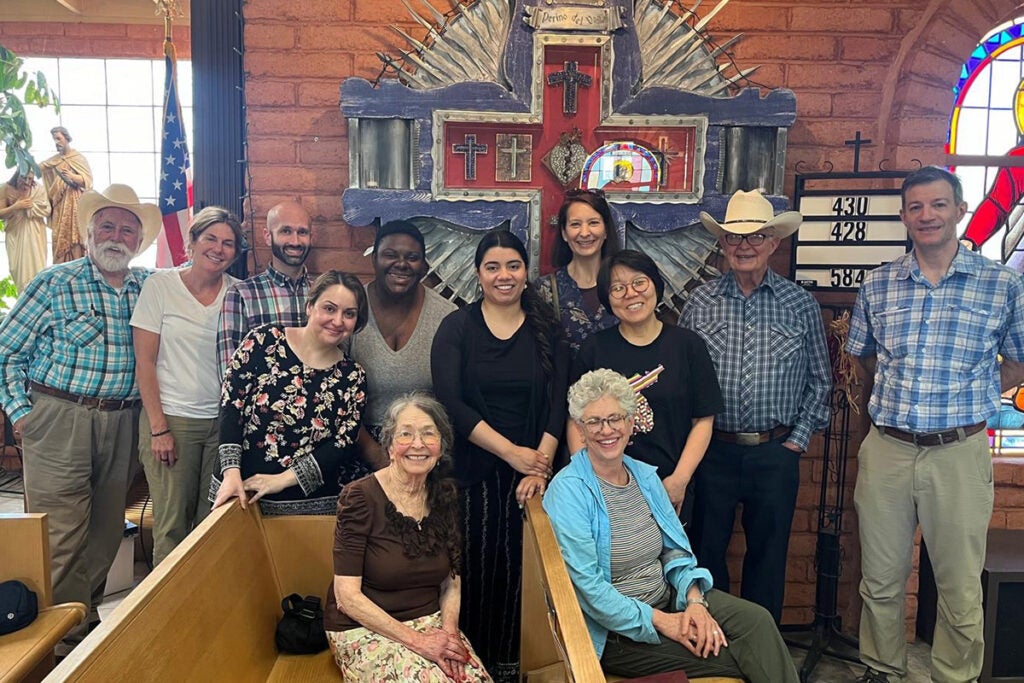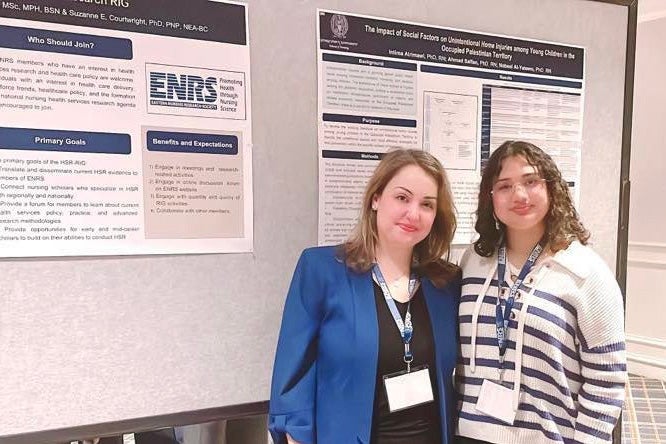Alrimawi Works to Bridge the Gaps in Health Care for Vulnerable Families

Intima Alrimawi, PhD, MSN, MPH
(September 11, 2024) — As a nurse working in primary, acute and intensive care settings, Intima Alrimawi, PhD, MSN, MPH, often saw families who had children with disabilities and chronic illnesses. Frequently, the families asked her questions that the patient’s doctor or main health care provider should have answered.
“They did not know basic things, such as the side effects of a medication or when to do follow-up or what follow-up is needed,” said Alrimawi, an associate professor in the School of Nursing. “As a community nurse, I was getting all of these questions, and I could see the gap here.”
Such gaps can have serious consequences. Alrimawi recounted the story of a young patient who was diagnosed with an antibiotic-treatable ear infection. However, his family didn’t have health insurance, so the infection went untreated, causing the child to lose hearing in the affected ear.
She said, “The family didn’t have information about how serious that can be and lacked access to the necessary health care. If you take that example and apply it to a family with a chronically ill child, you can see how serious the situation can become. This experience underscores the critical importance of support for vulnerable families and highlights a gap that requires bridging.”
Today, Alrimawi studies gaps in the health care system that can impact vulnerable families with children who have chronic illnesses and develops interventions that empower patients and promote health.
“There are a lot of gaps there, and it’s our role as health professionals to identify and address them,” she said.

Inspired by her academic interests in public health and vulnerable populations, Alrimawi (standing fourth from left) participated earlier this year in an immersive experience at the U.S./Mexico border with other faculty members from the School of Nursing and School of Health.
Supporting Vulnerable Families
Families impacted by health disparities, including immigrant and non-English-speaking families, are more vulnerable to gaps in the health care system than other families, and having a child with a disability or chronic illness can increase their risk even more.
Alrimawi is currently working with colleagues from the nursing school on developing a study to investigate whether such families benefit from the services of a dedicated patient navigator, especially if the patient navigator has personal experience dealing with the same illness or disability.
“Having a child with a chronic illness or disability can be challenging for the families, and they do feel like they’re alone,” she said. “We want the family navigator to be the parent of another child with a disability so they have experience with the process.”
She is also collaborating with a team of expert community health nursing researchers to conduct a scoping review that explores the challenges of providing care to immigrant families and their children across the lifespan, with the goal of sharing the findings through webinars, conferences and peer-reviewed publications.
Additionally, Alrimawi recently completed a research project that examined the impact of having two children with incurable or chronic illnesses on vulnerable families, a topic that has received little attention in the literature. “Most of the research focuses on having one child with a chronic or incurable illness,” she said. “If you have two children with chronic conditions, I’m sure your needs will be more, but nobody has looked into that.”
Alrimawi and colleagues are in the process of publishing a paper describing the findings of the study. “We need to delve into the specifics; what does that mean, and how can we support them in their daily lives as they deal with two children with chronic illness or other serious illness such as cancer.” she added, “Hopefully the findings of this study can give us some insight into that.”
‘You Cannot Do Research Alone’
Mentoring has played a pivotal role in Alrimawi’s career, and she named Edilma L. Yearwood, PhD, RN, PMHCNS-BC, professor of nursing and interim program director of the PhD in nursing program, as an influential mentor.

Alrimawi mentors undergraduate and graduate students on their research projects. Here, she is pictured with BSN student Shrishti Chhajlani (N’26), with whom she collaborated on research that Chhajlani presented at a recent nursing conference.
“I wanted to make an exceptional journey at Georgetown, so I needed a mentor to help me with that,” Alrimawi said. “I believe in mentorship, and it is needed for faculty and for students. We both need mentorship.”
Alrimawi mentors undergraduate and graduate students on their research projects, emphasizing the importance of evidence-based practice. “I believe it’s crucial for future nurses to understand how to gather evidence and comprehend its significance,” she said. “It’s a pleasure for me to witness their growth as they learn how to find evidence and appreciate its value.”
In addition to her mentoring work at Georgetown, Alrimawi also serves as one of the coordinators for the “global leadership mentoring in nursing” program with the Sigma Theta Tau, an international honor society for nursing, where she has previously participated as both a mentor and mentee.
Connecting with colleagues from other organizations is essential for success as a researcher, Alrimawi emphasized. “You can’t do research alone,” she said. “Throughout my journey, I’ve learned that collaboration is crucial. Many researchers are open to working with others, and this openness fosters innovation and effective problem-solving. Collaboration brings diverse perspectives, enriches work, and helps achieve goals that might be unattainable alone. It’s not just about individual success but about working together to make a meaningful impact in families and children’s lives.”
Kat Zambon
GUMC Communications
